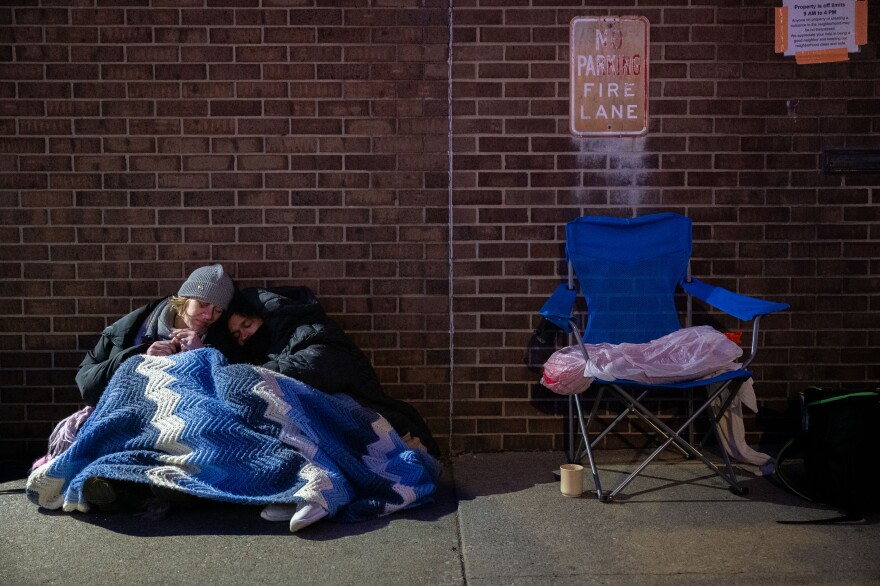University of Missouri president Mun Choi recently sent a list of demands to Columbia officials concerning addressing crime in the city. Among them, the “cleanup of homeless encampments.”
In an email sent to university students, staff, and faculty, Choi outlined priorities for increased safety downtown, including an increased police presence and stricter loitering laws. His statement is one of several issued by Columbia leaders in response to the death of Stephens College student Aiyanna Williams in a downtown shooting Saturday.
The suspect in Williams’ killing has no known connections to Columbia's unhoused community. To John Trapp — who leads 4-A-Change, a consulting firm working with the city’s Downtown Community Improvement District to aid the homeless population — that makes Choi’s mention of encampments concerning.
“I feel that the university president is using a tragedy,” Trapp said. “A young woman died, but it had nothing to do with homelessness. To use that as a pretext to crack down on homelessness, demand other people crack down on homelessness, seems really cynical.”
Jane Williams is the executive director of Love Columbia, an organization that connects Columbians with food, shelter and other resources. She said it’s true that people living on the streets downtown can make some feel unsafe. But, she said, making people feel safer should start with addressing the reasons someone is on the street to begin with.
“It would be good if we had more shelter space so people have a place to go at night instead of sleeping on our streets,” she said.
Williams suggested that Choi’s inclusion of homelessness on his list of demands may be related to an upcoming Missouri Department of Natural Resources deadline for MU and Columbia to address homeless encampments near waterways. KBIA was unable to confirm any relation between Choi’s statement and the DNR decision.
Williams said she welcomes positive change from the city, and she’s hopeful that the renewed attention on downtown will lead to “closer working relationships” between the city and key stakeholders. Still, she said any actions the city takes should be accompanied by a longer-term solution to the area’s affordable housing shortage.
“We have to have a place for people to go, we can’t just sweep the encampments,” Williams said.
Choi’s statement did not mention firearms, a decision he maintained in a press conference Monday, where he said “the law did not stop” Saturday’s shooter. To Trapp, Choi’s omission leaves out a critical part of making downtown safer.
“He should go to the governor and demand gun control to prevent this sort of thing,” Trapp said, “Because that’s the real problem. It’s not homeless people.”
Williams said finding humane ways to get people off the streets and into secure housing is the only way to solve the issue of homeless encampments long-term, and ultimately make Columbia safer. Currently, she said, the city’s shelter options are at their maximum capacity.
Trapp said Choi’s statement shows he’s calling for the “criminalization of homelessness” in Columbia — an approach he said is ineffective at addressing the issue.
“Criminalizing homeless people is not a solution,” Trapp said. “It’s been tried elsewhere, it has not worked anywhere, and it won’t work here.”
Both he and Williams pointed to the Opportunity Campus, slated to open in the next year, which will include shelter and other resources. Trapp said those kinds of alternatives have to exist before Columbia can “clean up” the places where homeless people live now.
“If we go and bulldoze down their camp, they’re still gonna exist, they’re still gonna be homeless,” Trapp said. “They’re part of our community, and we need to embrace them as our neighbors and figure out a solution that works for all of us.”
University representatives declined to elaborate on Choi’s statement.



![[Caption] on Monday, Sept. 29, 2025, at Jesse Hall in Columbia.](https://npr.brightspotcdn.com/dims4/default/587db92/2147483647/strip/true/crop/1750x1158+0+13/resize/130x86!/quality/90/?url=http%3A%2F%2Fnpr-brightspot.s3.amazonaws.com%2F0d%2F8d%2F742f927944449fb00ace10555e90%2F20250925-crimeconference-xa-035-copy.jpg)

